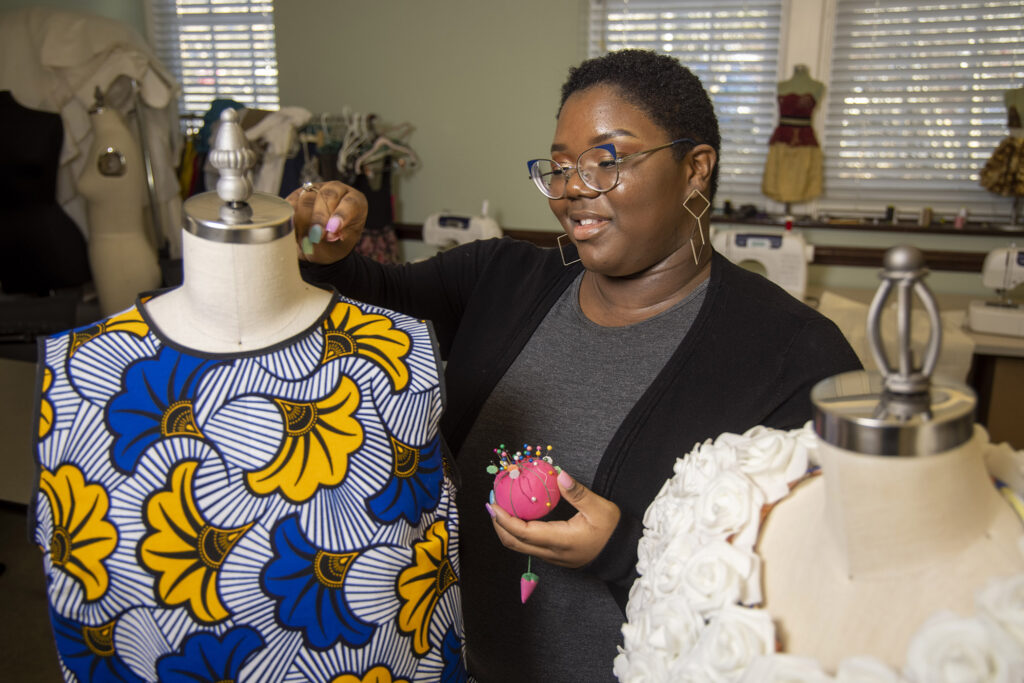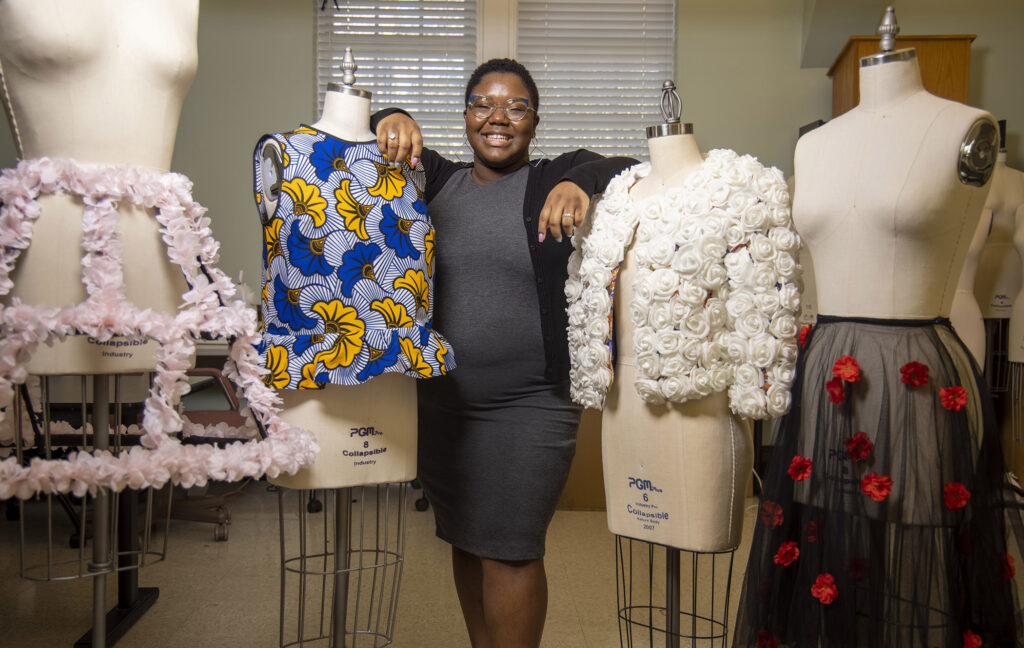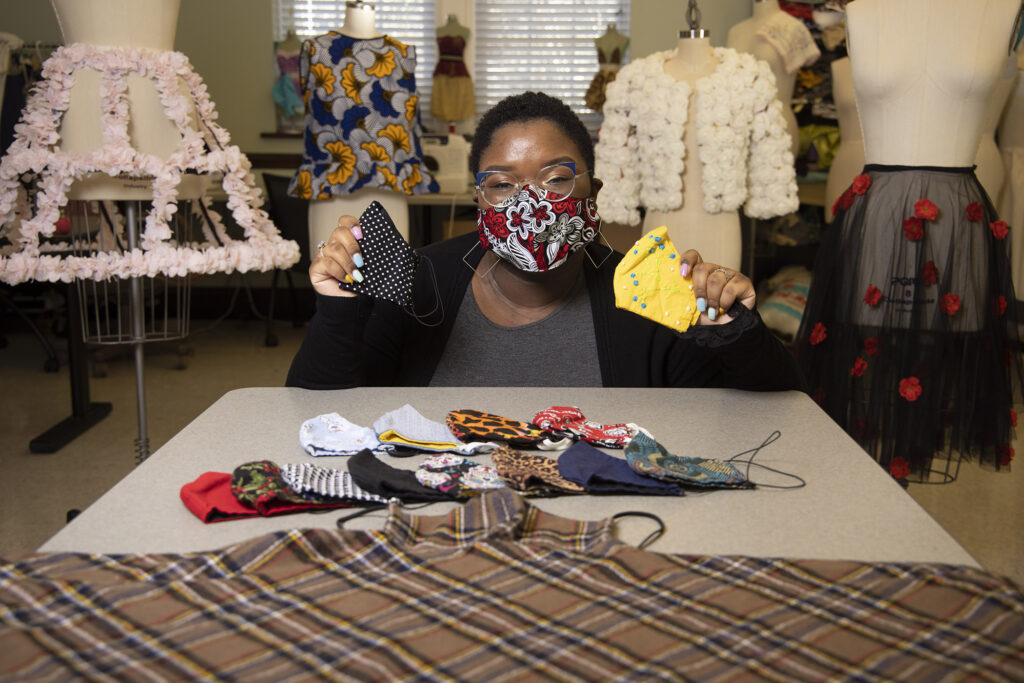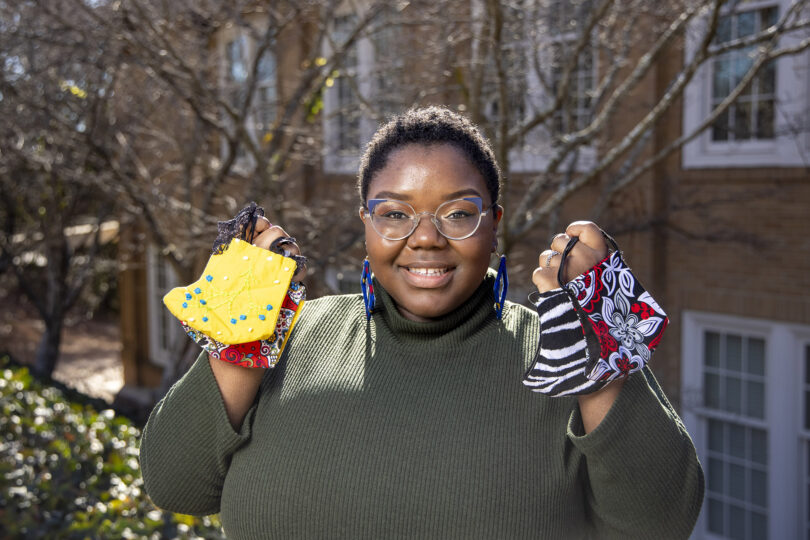If you ever see someone walking slowly—Nakyra Milner says to calm down and have a little empathy.
Milner, a senior fashion merchandising major from Locust Grove, said slow walkers used to be her pet peeve. But at the end of her freshman year, Milner was diagnosed with Multiple Sclerosis. The disease especially impacts her balance. For her own safety, she now walks slowly, often towards the edge of the sidewalk to make it easy for people in a hurry to go around her. She might even pretend to be on the phone or be looking for someone.
“It would be so much easier if people would just calm down and realize not everyone has the same privilege,” she said. “Be more empathetic.”
Her illness is mostly invisible. Looking at her, there aren’t signs of the disease. But MS, an autoimmune disorder where the immune system attacks the central nervous system, affects everyone differently. It might affect vision or cause muscle spasms. And the disorder looks different from person to person.
MS diagnosis
Milner has been navigating MS for three years now.
One Thursday, she woke up and her balance was off. She couldn’t walk straight, and her left side felt both weak and heavy. She didn’t feel sick, but her body didn’t feel right. Her parents drove in from Henry County to take her to the emergency room. Her doctor checked her CAT scans, saw the spots in her brain scan and thought she had MS. A week later, a neurologist made the official diagnosis.
Milner went from being a normal college student to having a disability in that one episode.
She ended up taking a year off of the University of Georgia, attending a local community college to adjust to her new life.
MS is a chronic condition—it doesn’t go away. “Something will always be wrong—every day for the rest of your life,” she said. “There’s no on and off switch. It doesn’t die down. It doesn’t change. The best thing you can do is get on a good treatment plan.”
Navigating UGA with a disability
At UGA, Milner carefully controls her schedule—always allowing for ample time between classes so she can get to Dawson Hall, Gilbert Hall or wherever her class is. When she loses muscle coordination in her hand, she can use a smart pen to record lectures. When plugged into her computer, the smart pen creates a PDF of the lecture notes. She can also use a notetaker for her courses, which comes in handy when she goes to Atlanta for treatment infusions. In total, she uses four disability accommodations through the Disability Resource Center, which all make it so that she’s able to successfully attend classes both on campus and virtually. Milner has also become a Digital Dawg and part of the Disability Resource Center’s Speakers Bureau—to better advocate for and raise awareness for students with disability.

Nakyra Milner works on a design project in the College of Family and Consumer Sciences sewing lab. Milner found fashion her senior year of high school—and loves how fashion can change the way someone thinks about themself, make them feel more confident or beautiful. (Photo by Peter Frey/UGA)
Fashion merchandising
Milner is studying fashion merchandising in College of Family and Consumer Sciences with an emphasis in product development and design, and a double minor in Spanish and general business. This semester, most of her classes are online because of pandemic health concerns, but she does have two labs on-campus—computer-assisted design and a textile testing lab, where the course highlight is lighting clothing on fire to test flammability.
Eventually, she wants to have her own size-inclusive formalwear boutique.
In high school, Milner described herself as a T-shirt and jeans girl—someone not really interested in clothes. That all changed when she went prom dress shopping and saw all the colorful dresses.
“For the first time ever, I felt so beautiful and pretty. I would have never used those words to describe myself,” she said.
And that’s where her interest in fashion merchandising comes from. “I was able to look at myself in a different way,” she said. “I wanted to help other people like me have that experience with fashion.”

Undergraduate student Nakyra Milner in the Family and Consumer Sciences sewing lab with some of her design projects on dress forms. (Photo by Peter Frey/UGA)
Plus-size fashion
Plus-size fashion is an area she’s particularly interested in. After college, she’d like to work with a brand to increase their size range.
Last semester, she wrote a paper on clothing deprivation and the mental impact of the perceived lack of clothing as a plus-sized person. “With the body positivity movement a few years ago, we really started to have these conversations about different experiences of what it’s like to be plus-sized, not having those clothes.”

Nakyra Milner has worked with the Fashion Design Student Association and designs for their fashion shows. When the theme was unconventional Met Gala, she designed a cage skirt made out of Hula-Hoops and clothing hangers and covered with flower garlands. She loves flowers, and flowers feature prominently in her designs. (Photo by Peter Frey/UGA)
Design
She’s worked with the Fashion Design Student Association and designs for their fashion shows. She’s also designed for the African Student Union. In particular, her face masks are in high demand.
In fall 2019, she created cloth face masks for the dancers to wear.
Did she predict the pandemic? “I made masks before it was cool,” she said with a laugh. She spent the summer sewing and selling cloth face masks and used the money to buy a heavy-duty sewing machine.
What’s next
Milner tries not to let the MS define her. Every day, she’s a little more confident and better able to navigate college and having a disability. Her treatment is working well to control her physical symptoms and therapy helps with some of the mental symptoms. And she’s excited about what’s next—internships and post-graduation jobs.
And while she likes sewing floral face masks, she’s looking forward to the day when the face masks are a novel artful accessory for a dance performance, not a health requirement.








